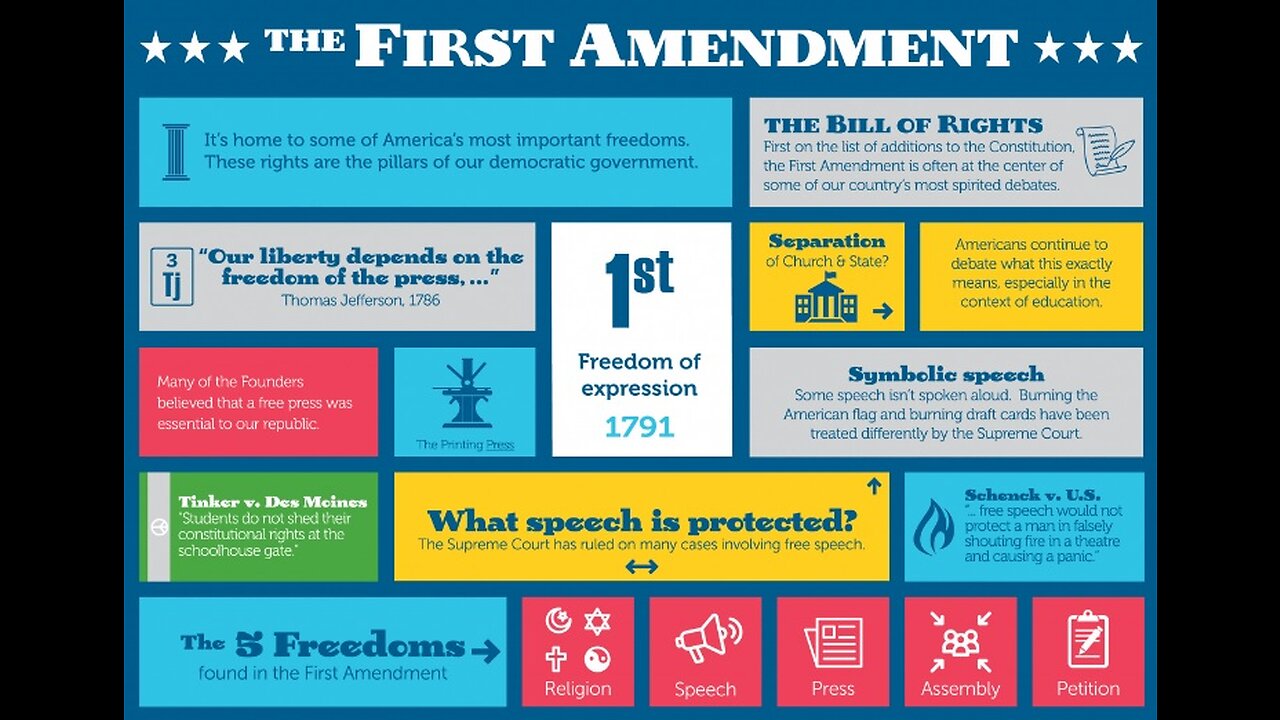Premium Only Content

Islamic Law and Courts Are Alive and Well in U.S.A. vs. USC 1st Amendment Laws W0W
Americans often react to the idea of Sharia with horror and repugnance. That isn’t warranted. The complex interplay between American society and immigrants’ religious beliefs has a long and rich history in the U.S.A. Teenage Girls Who are forced to marry. Hands amputated as punishment for theft.
Although Muslim women are more likely to have their daughter circumcised, the findings suggest the importance of a collective rather than individual Muslim identity for the continuation of the practice. Keywords 200,000+female genital cutting a year, intergenerational transmission, convention theory, Burkina Faso Female genital cutting, also known as female genital mutilation or female circumcision, is a term used to describe operations on female genitalia ranging from a small nick in the clitoris to total removal of the clitoris and labia.
The relationship between religious obligations and female genital cutting is explored using data from a religiously and ethnically diverse country where approximately three-quarters of adult women are circumcised over 400 Million so far. now It is estimated that more than 200 million girls and women who are still alive today and not be-head yet, have undergone female genital mutilation in the countries where the practice is concentrated. Furthermore, there are an estimated 6 million girls at risk of undergoing female genital mutilation every year.
Women who are rarely allowed to leave the house and, when they do, are required to wear oppressive, black burqas covering their bodies, faces, and hands. These are the images that come to many people’s minds when they think of Islamic law.
The resulting emotions are often panic, fear, and disgust about Sharia in America, and the conflict that arises between groups is a flashpoint for heated debate: It generates marches and counter protests, editorials, and counter-editorials.
Beheadings have made a dramatic resurgence in the past four years especially with the introduction of videotaped executions broadcast in the mass media. The use of beheadings has a longstanding history. Beheadings have been used in a state and non-state capacity, for punishment or intimidation, against leaders, civilians and warring combatants, during times of peace and that of upheaval. Beheadings today reproduce the characteristics of past beheadings as well as deviate from them. Contemporary beheadings have taken on a more criminal nature while beheadings of the past had more legitimacy and some even were considered honorable. Current beheading tactics include unexpected and illegal targets, unorthodox and barbaric techniques, and irregular display to an unprepared public. Although Islamic militants are the predominant be-headers, there is evidence that beheadings are being conducted by non-Islamic entities and in unexpected locations. If the current trend in the use of beheadings continues, it will be necessary to develop countermeasures, which will be facilitated with an understanding of the political, cultural, and criminal motives of the beheading offenders along with their tactics.
As an American anthropologist working in the United States, I have watched the opposition to Sharia grow in recent years. It misrepresents what Sharia really is. My work over the past four years shows that people’s fears are largely unfounded. As an American who appreciates the core American values of inclusiveness, liberty, and the rule of law, I think it’s important to help dispel the myths that fuel these reactions.
The commonly held stereotypes about Sharia are illusions conjured up from a reservoir of misunderstandings and half-truths. My work has shown that most of the world’s nearly 2 billion Muslims would not recognize the draconian practices described above as being part of the Islamic law they follow. Instead, their Sharia allows them to lead lives that are fundamentally no different than their Christian, Hindu, Buddhist, Jewish, or secular neighbors.
“Sharia” is the Arabic term for Islamic law, and it literally translates as “a path to water where people can drink and seek nourishment.” It is helpful to think of Islamic law less like American criminal law—which tells citizens how to behave and what to do to avoid being thrown in jail—and more like a guidebook on how to lead a life pleasing to God. Islamic scholars see this guidebook as the path and the sweet drink at its end as divine salvation. Sharia lays out how Muslims can become better friends, family members, and citizens.
This aspect of Sharia—those elements of Islamic law that facilitate Muslims’ interactions with society rather than preventing them from fully engaging with it—is either ignored in the face of more radical interpretations or entirely unknown to the general public in the U.S. Instead of seeing how most Muslims are already living in harmony with their non-Muslim neighbors and using Islamic law as a way to guide their lives, many people assume that every Muslim who follows Sharia is a radical. For most Muslims, the path of Sharia does not lead down this road at all. Instead it is one of harmony and cooperation.
Paths Can Be tricky, however, especially when they are meant to lead to God. Just as there are many paths to a well, Muslim scholars hold that there are many valid interpretations of Islamic law—and some paths that might lead one astray. Throughout most of Islam’s history, scholars have interpreted the law. So there is some flexibility in how it is applied: As long as scholars follow the general rules of interpretation and don’t impose unreasonable hardships on people, their rulings are deemed correct. It is only in more recent times that some interpretations of Islamic law have emerged that are far more intolerant and extreme than most. More radical interpretations claim that there is only one Sharia—just a single path to the sweet water of Heaven—and that only those who follow this path can find divine salvation. This is the path of intolerance, a rejection of democracy, and an exaltation of Muslims above all others.
Islamic law does contain guidance on crime and punishment, but the way it is interpreted in the U.S. does not create a conflict with American law. Most American Muslims and scholars of Islam believe that because their national criminal system is fast, efficient, and humane, they do not need to rely on Islamic law to prosecute crimes. The American judicial system works—it does this job for them—and so the community is relieved of following any penal aspects of Islamic law.
As a result, for American Muslims, Islamic law mostly governs aspects of private life. It has something to say about how people get married (including that the woman must agree to the marriage), buy a first home (Sharia forbids taking out an interest-based loan from a bank), plan a funeral (the body of the deceased must be buried as soon as possible), or come together for a festive meal (alcohol is not allowed). Essentially, Islamic law functions in an identical way to Jewish law, the Halakha, which has had a vibrant existence in the United States for centuries.
But Sharia, As with other religious groups’ laws, does not always perfectly mesh with American society or American values. For example, the Islamic law forbidding the use of interest-bearing financial products means that many Muslims refuse to use credit cards, take out auto loans, or have home mortgages with banks—things many Americans consider necessary and ordinary. For another example, a very small number of American Muslims practice polygamy (as do some fundamentalist Mormons).
Slave-girls as sexual property in the Quran - James M. Arlandson - Would you join a religion that permitted men to have sex with their slave-girls throughout their enslavement-if this religion codified this act in its holy book?
Many persons in the West (and elsewhere) who convert to Islam are women. I just got an email from a Muslim woman who said she converted to Islam two years ago. Would women do this if they knew about ALL of this religion? Reasonable women should stop and think a second time before taking this serious step (but a reversible one, albeit punishable by death in many Islamic countries).
Islam goes more deeply than just the benign Five Pillars. It has many unpleasant truths lurking in its sacred texts. The goal of this article is to bring out yet another of these truths, so people can make fully informed decisions from all of the facts. Would the true God inspire the following verses six hundred years after Jesus showed us a better way?
Sex with slave-girls in times of peace Sura (Chapter) 23 was revealed during Muhammad's life in Mecca before his Hijrah or Emigration from his home city to Medina in AD 622. During the early years of his ministry, he never waged war on anyone, so these were times of peace, although he suffered from a measure of persecution. For more information on the historical and the literary topical contexts of Sura 23,
The Quran in Sura 23:5-6 says: 5 [Most certainly true believers] . . . guard their private parts scrupulously, 6 except with regard to their wives and those who are legally in their possession, for in that case they shall not be blameworthy. (Sayyid Abul A'La Maududi, The Meaning of the Quran, vol. 3, p. 237)
The key words are "those who are legally in their possession." Maududi (d. 1979) is a highly respected commentator on the Quran, and he interprets the plain meaning of the clause, saying that sex with slave-girls is lawful.
Maududi writes: Two categories of women have been excluded from the general command of guarding the private parts: (a) wives, (b) women who are legally in one's possession, i.e. slave-girls. Thus the verse clearly lays down the law that one is allowed to have sexual relation with one's slave-girl as with one's wife, the basis being possession and not marriage. If marriage had been the condition, the slave-girl also would have been included among the wives, and there was no need to mention them separately. (Ibid. p. 241, note 7)
The main point in this section, which Maududi overlooks or refuses to criticize, is that Muhammad himself endorses not only the entire institution of slavery, but also sex between male owners and their female slaves within this institution. But how can he and devout Muslims criticize their prophet without seriously damaging Islam? But Muslims must do this, if they think clearly and critically, and for the good of humanity.
It should be noted that Sura 70:29-30, also revealed in Mecca, uses nearly the identical words as Sura 23:5-6. Men must guard their private parts from everyone but their wives and slave-girls, meaning that men may have sex with both "categories" (Maududi's word).
If readers would like to see these verses in multiple translations, they should go to this website. This one has three translations, and this one is funded by the Saudi royal family.
Sex with slave-girls in times of war Now Muhammad has emigrated from Mecca to Medina. By the time Sura 4 is revealed, where our next Quranic verse is found, he has fought many wars and skirmishes. For example, he fights the Meccans in the Battle of Badr in AD 624 and again the Meccans at the Battle of Uhud in AD 625. He also exiles the Jewish tribes of Qaynuqa in AD 624 and Nadir in AD 625. He carries forward this policy of sex between male owners and their female slaves to his new city of Medina, with the added twist of enslaving women prisoners of war and permitting his soldiers to have sex with them. For more information on the historical and literary topical contexts of this next sura,
The Quran in Sura 4:24 says: And forbidden to you are wedded wives of other people except those who have fallen in your hands (as prisoners of war) . . . (Maududi, vol. 1, p. 319). (See also Suras 4:3 and 33:50)
Thus, women captives are sometimes forced to marry their Muslim masters, regardless of the marital status of the women. That is, the masters are allowed to have sex with the enslaved human property.
Maududi says in his comment on the verse that it is lawful for Muslim holy warriors to marry women prisoners of war even when their husbands are still alive. But what happens if the husbands are captured with their wives? Maududi cites a school of law that says Muslims may not marry them, but two other schools say that the marriage between the captive husbands and wives is broken (note 44).
But why would a debate over this cruelty emerge? The answer is obvious for those who understand simple justice. No sex should take place between married female prisoners of war and their captors. In fact, no sex should take place between women captives and their Muslim overlords under any circumstance.
This sexual injustice is reprehensible, but Allah wills it nonetheless-the Quran says so. Predictably, the hadith perpetuate this Quran-inspired immorality. The hadith are the reports of Muhammad's actions and words outside of the Quran. The most reliable collector and editor is Bukhari (d. 870).
The hadith demonstrate that Muslims jihadists actually have sex with the captured women, whether or not they are married. In the following passage, Khumus is one-fifth of the spoils of war. Ali, Muhammad's cousin and son-in-law, just finished a relaxing bath. Why?
The Prophet sent Ali to Khalid to bring the Khumus (of the booty) and . . . Ali had taken a bath (after a sexual act with a slave-girl from the Khumus). What was Muhammad's response to the person who hated Ali for this sexual act? Do you hate Ali for this? . . . Don't hate him, for he deserves more than that from [the] Khumus. (Bukhari)
Thus, Muhammad casually believes that slave women who are part of the one-fifth of the spoils of war can be treated like sexual property. Ali is a Muslim hero. He was the husband of Fatima, Muhammad's daughter by his first wife Khadija. So why would the model prophet for the world scold his son-in-law for having sex with a slave-girl? After all, slaves are fair sexual game. The Quran says so.
Moreover, holy jihadists may not practice coitus interruptus with the women they capture, but not for the reason one expects: simple justice. While on a military campaign and away from their wives, Muslim jihadists "received captives from among the Arab captives and we desired women and celibacy became hard on us and we loved to do coitus interruptus." They asked the holy prophet about this, and it is important to note what he did not say. He did not scold them or prohibit any kind of sex whatsoever, declaring it haram (forbidden). Rather, he gets lost in theology and the quirky doctrine of fate:
It is better for you not to do so [practice coitus interruptus]. There is no person that is destined to exist, but will come to existence, till the Day of Resurrection. (Bukhari; for parallel hadiths go here and here)
That is, these enquiring Muslims should stop doing coitus interruptus, but instead go all the way with the enslaved sex objects. Fate controls who should be born. Muhammad does not prohibit this extremely immoral practice just when the time was right to forbid it.
It is one thing for some soldiers in any army to strike out on their own and rape women. All armies have criminal soldiers who commit this wrong act. But it is quite another to codify rape in a sacred text.
Islam codifies and legalizes rape. It is disappointing that the Quran does not abolish this sexual crime in the clearest terms: Thou shalt not have sex with slave-girls under any circumstance!
Conclusion: It may be argued that American slave-owners committed sexual crimes against their slaves before the Civil War (1861-1865), so who are Christians or Americans (the two are not identical) to complain about Islam?
In reply, however, the two situations are different. First, it is wrong to compare the US with the Muslim community founded by Muhammad, who claimed divine inspiration. Instead, it is best to compare the founder of a religion (Jesus) with another founder (Muhammad). Second, in no place in the New Testament does God give permission to men-Christian or secular-to have sex with slave-girls. This would violate the spirit of Jesus' ministry and the entire writings of the New Testament authors, who understood Jesus as fulfilling the Old Testament. If Americans in a bygone era did this, then they were not following God's law. The Quran, however, codifies and legalizes this sexual crime, and allegedly this book came down from Allah through Gabriel to Muhammad. Any clear-thinking individual can see that having sex with women in their most desperate condition (slavery) is wrong.
But the real issue is much larger than questions about American history. The following question must be asked and answered: Is Muhammad, the Quran, and Islam the best prophet, book, and religion to lead humanity into the new millennium?
For those of us on the outside of Islam who examine the evidence with as much objectivity as we can and who have not been blinded by a lifetime of devotion to Islam, the answer to this rhetorical question is obvious: no, they are not the best to lead all of humanity into the new millennium.
Therefore, all clear-thinking Muslims who live under hyper-religious oppressors must throw them off and ignite secular revolutions, such as the one that happened in Turkey after World War I. Maybe this will happen in Iran, and maybe Iraq will steer clear of sharia (Islamic law), as Iraqis take their first baby steps towards democracy. They must get away from the Quran and Muhammad's example.
Until these revolutions happen and until religious leaders renounce many verses in the Quran and the hadith, we on the outside of this religion are allowed to distrust Muhammad's religion. And women who are tempted to convert to this religion must stop and think a second time.
Of course, these conflicts are nothing new. Virtually every religious group has had to accommodate U.S. law—and in numerous cases, the U.S. has adjusted to the beliefs of religious groups. In the Amish community, which follows their own law, called Ordnung, conflicts between Amish and American law even created an important Supreme Court decision in 1972: The court recognized the importance of religious freedom and upheld the right of Amish families in Wisconsin to remove their children from school after the eighth grade. Many Mormons have had to change elements of their family practices, including polygamy, to abide by U.S. laws. And American Jews who follow Halakha have courts and institutions that enforce it called the Beth Din. These courts have operated both formally and informally in conjunction with American society for as long as Jews have resided in the U.S.A.
Some Americans become particularly concerned when they think about Sharia invading their national courts. The fear and alarm driving people’s activism have already led to more than half a dozen states passing some sort of measure to stop their courts from considering foreign, international, or religious law. But panic-stricken rumors that U.S. courts are enforcing Sharia have been blown out of proportion: What is really happening is that the court is allowing U.S. citizens to set their own rules and resolve their own disputes through contractual agreements, as long as these aren’t in conflict with American law.
This happens when, say, two Muslims agree by contract to have some business disagreement solved by an Islamic arbitration committee, several of which exist in the U.S. in states like Texas and New York. If the parties disagree with the arbitration, they might take it to an American court of law, which would likely uphold the original contract and the decision of the Islamic arbitration committee. Virtually every religious group in the U.S. uses private arbitration committees, including the Jewish community and some Christians.
Similarly, the American legal system allows for individuals to create their own rules around things like wills and divorce settlements, so the court will uphold legally created documents that incorporate Islamic (or Jewish) law alongside personal wishes. Traditionally, the political system of the U.S. has viewed such arrangements positively, as extensions of individual liberty.
While Muslims are among the newest religious immigrants to the United States, they are joining a long line of people who have had to accommodate their religious and personal needs to a new cultural and legal environment. Like all who came before them, Muslims have some issues that are difficult to fit into the mainstream. But, like other religious groups, these are challenges they meet with care and thought. Islamic law, far from being a strict, draconian code of medieval discipline, can adapt to new circumstances—a very American virtue. U.S. citizens should accept this Americanization of Islamic law with open arms.
An Overview of the 1st Amendment First Amendment: Religion and Expression
What is the First Amendment?
Congress shall make no law respecting an establishment of religion, or prohibiting the free exercise thereof; or abridging the freedom of speech, or of the press, or the right of the people peaceably to assemble, and to petition the Government for a redress of grievances.
The First Amendment Defined:
The First Amendment is a part of the Bill of Rights, which are the first 10 Amendments to the United States Constitution and the framework to elucidate upon the freedoms of the individual. The Bill of Rights was proposed and sent to the states by the first session of the First Congress. They were later ratified on December 15, 1791.
The first 10 Amendments to the United States Constitution were introduced by James Madison as a series of legislative articles and came into effect as Constitutional Amendments following the process of ratification by three-fourths of the States on December 15, 1791.
Stipulations of the 1st Amendment:
The First Amendment to the United States Constitution prohibits the passing or creation of any law that establishes a religious body and directly impedes an individual’s right to practice whichever religion they see fit.
The First Amendment to the United States Constitution is a part of the Bill of Rights and the amendment which disables an entity or individual from practicing or enforcing a religious viewpoint which infringes on the freedom of speech, the right peaceable assemble, the freedom of the press, or which prohibits the petitioning for a governmental evaluation of grievances.
In its infancy, the First Amendment only applied to laws enacted by Congress; however, the following Gitlow v. New York, the Supreme Court developed that the Due Process Clause attached to the Fourteenth Amendment applies the fundamental aspects of the First Amendment to each individual state, including all local governments within those states.
The Establishment clause of the First Amendment is the primary pronouncement in the Amendment, stating that Congress cannot institute a law to establish a national religion for the preference of the U.S. government states that one religion does not favor another. As a result, the Establishment Clause effectively created a wall of separation between the church and state.
How the First Amendment was created:
When the original constitution was created there was significant opposition due to the lack of adequate guarantees for civil freedoms. To offer such liberties, the First Amendment (in addition to the rest of the Bill of Rights) was offered to the states for ratification on September 25, 1789, and later adopted on December 15, 1791.
Court Cases tied into the 1st Amendment
In Sherbert v. Verner, the Supreme Court applied the strict scrutiny standard of review to the Establishment Clause, ruling that a state must demonstrate an overwhelming interest in restricting religious activities.
In Employment Division v Smith, the Supreme Court went away from this standard by permitting governmental actions that were neutral regarding religious choices.
Debs v. the United States on June 16, 1919, tested the limits of free speech in regards to the “clear and present danger” test.
1st Amendment: Freedom of Speech
Freedom of speech in the United States is protected by the First Amendment and is re-established in the majority of state and federal laws. This particular clause typically protects an individual’s right to partake in even distasteful rhetoric, such as racist or sexist comments and distasteful remarks towards the public policy.
Speech directed towards some subjects; however, such as child pornography or speech that incites an imminent threat, as well as commercial forms of speech are regulated.
-
 15:11:23
15:11:23
What If Everything You Were Taught Was A Lie?
10 days agoOur 900th Video A True History Documentaries 15 Hours Ancient, Medieval, Modern Civilizations
3.62K9 -
 LIVE
LIVE
Grant Stinchfield
1 hour agoThe FBI Withholds 5000 Names of Agents & Employees Who Hunted Down J6'ers
305 watching -
 LIVE
LIVE
LFA TV
16 hours agoMA-GAZA STRIP! | LIVE FROM AMERICA 2.5.25 11am
6,336 watching -
 2:14:55
2:14:55
Matt Kohrs
10 hours agoBreaking Market News, Earnings Review & Live Trading $1M || The MK Show
66.9K1 -
 1:27:18
1:27:18
Caleb Hammer
2 hours agoRadical Femcel Is Literal Garbage | Financial Audit
16.5K1 -
 38:57
38:57
Rethinking the Dollar
2 hours agoEvery Signature Counts: How Trump's Policies Threaten the Dollar's Stability
32.1K5 -
 15:36
15:36
Dr David Jockers
2 hours ago $0.75 earnedWhat's the Dark Side of Eggs That No One Talks About?
18.6K4 -
 38:35
38:35
BonginoReport
6 hours agoTrump is Conquering a Foreign Land and It’s Not Greenland (Ep.133) - 02/05/2025
156K219 -
 2:58:44
2:58:44
Wendy Bell Radio
8 hours agoTaking Out The Trash
104K59 -
 1:22:24
1:22:24
Graham Allen
5 hours agoDems Try To RAID USAID Office!! + Trump Meets With Netanyahu In The Oval Office! Peace Is HERE!!
67.8K64